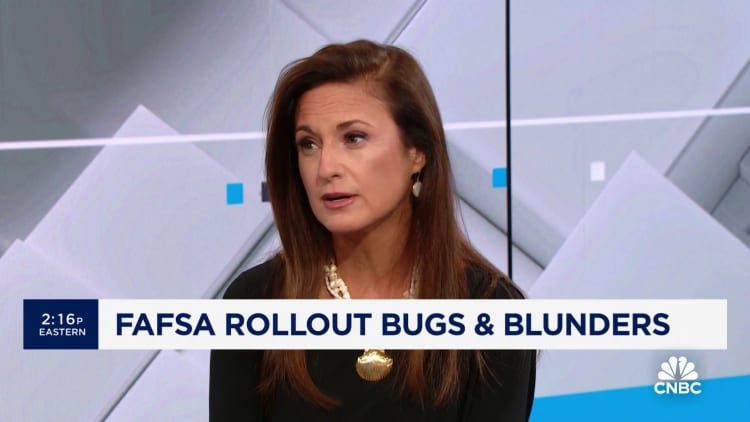

The “phased rollout” of the new Free Application for Federal Student Aid is on track for the upcoming academic year, the U.S. Department of Education says.
So far, the 2025-26 FAFSA has been available to limited groups of students in a series of beta tests that began on Oct. 1. It will become available to all students and contributors on or before Dec. 1, the Education Department said. (Typically, all students have access to the coming academic year’s form in October, but last year’s new simplified form wasn’t available until late December after a monthslong delay.)
“I am confident we will able to launch next year’s form by December 1,” James Kvaal, Under Secretary of Education, told CNBC.
More from Personal Finance:
Top 10 colleges for financial aid
More of the nation’s top colleges roll out no-loan policies
Some families pay $500,000 for Ivy League admissions consulting
Yet there are still “many unresolved problems,” some of which also plagued last year’s college aid application cycle, according to higher education expert Mark Kantrowitz.
As of Oct. 29, the government’s FAFSA Issues page lists 22 unresolved issues, down from 25 a few weeks ago, he said.
Last year, some high school seniors said complications with the new form weighed heavily on their decisions about college.
“We’ve heard from a lot of students and families that were frustrated,” Kvaal said. “We’ve made a lot of progress resolving those issues and we are now seeing more students able to complete their form.”
The FAFSA’s impact on college choices
For many students, financial aid is crucial when it comes to covering the cost of college.
Higher education already costs more than most families can afford, and college costs are still rising. Tuition and fees plus room and board for a four-year private college averaged $58,600 in the 2024-25 school year, up from $56,390 a year earlier. At four-year, in-state public colleges, it was $24,920, up from $24,080, the College Board found.
The FAFSA serves as the gateway to all federal aid money, including federal student loans, work-study and especially grants — which have become the most crucial kind of assistance because they typically do not need to be repaid.
Submitting a FAFSA is also one of the best predictors of whether a high school senior will go on to college, according to the National College Attainment Network. Seniors who complete the FAFSA are 84% more likely to enroll in college directly after high school, according to an NCAN study of 2013 data.
Freshman enrollment is down
In part because of issues with the new form, the number of new first-year college students sank 5% this fall compared with last year, according to an analysis of early data by the National Student Clearinghouse Research Center.
The declines in first-year student enrollment were most significant at four-year colleges that serve low-income students, the report also found. At four-year colleges where large shares of students receive Pell Grants, first-year student enrollment sank more than 10%.
The steep drop was “shocking,” particularly at schools that serve a high share of lower-income student said Ellie Bruecker, director of research at The Institute for College Access and Success.
“It’s a very big deal to see that level of decline,” she added.
Bruecker also said she expects the Education Department will be able to meet the deadlines that they’ve set for the the 2025-26 form.
But even if all goes well, students are still working within a condensed time frame compared to the typical October FAFSA rollout, which may be to their disadvantage, she added.
“Even if everything goes smoothly this time, we are still working on a shorter time line — it’s cutting off two to three months,” she said. For families and students dependent on financial aid, “that could feel very stressful.”
